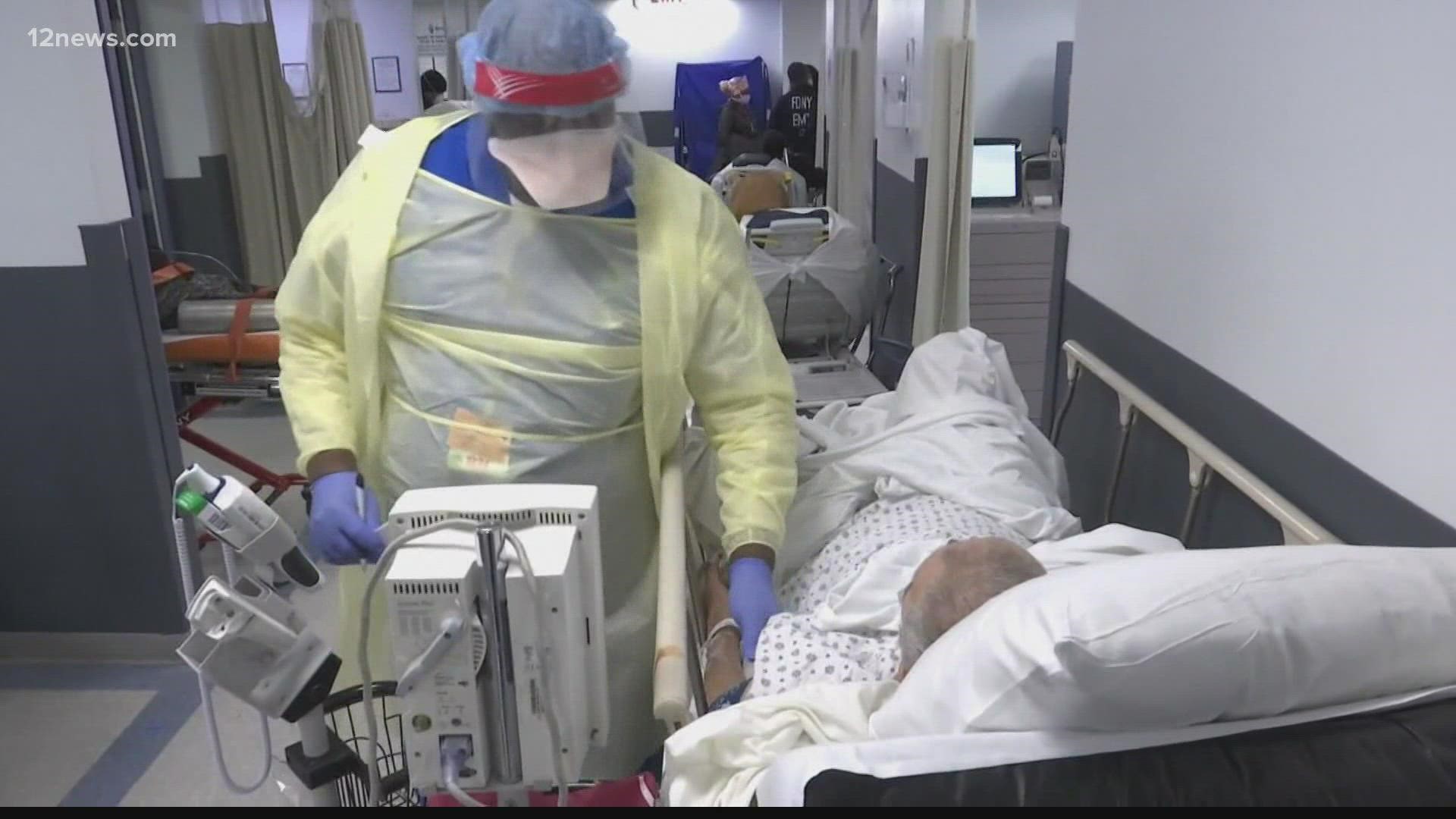PHOENIX — Arizona's largest hospital network warned Tuesday that it might have to cut back on care in mid-January, as patient counts hit their highest level of the almost 2-year-old pandemic.
"If our continued forecast holds true, we will be in a position where we will be unable to meet the care needs of all of Arizonans," Dr. Marjorie Bessel, Phoenix-based Banner's chief clinical officer, said at a virtual news conference with reporters.
"We do not want to get there. You do not want us to get there."
In that scenario, Banner would shift to "crisis standards of care," Bessel said. The chain's 18 hospitals could decide who gets the care and who gets a bed.
The hospitals are currently operating under a "contingency level of care."
"We're not at our normal operations," Bessel said. "It means things like we might be doing less documentation than we previously do. It means things like we may be having staff working different types of units that they don't normally work in."
Banner forecasts that hospitalizations and COVID cases will peak in mid-January. The forecast doesn't take into account the potential impact of the omicron variant. Bessel said it's too soon to know.
RELATED: Arizona has lowest amount of open hospital beds now than any other time in the COVID-19 pandemic
Why Banner's Being Squeezed
Here's why Banner's hospitals are being squeezed:
COVID patients in ICUs:
Unvaccinated COVID patients are filling up intensive care units.
Bessel said 36 percent of the patients in Banner's ICUs had COVID-19; 88 percent of those COVID patients were unvaccinated. In some instances, every COVID patient in a Banner ICU was unvaccinated.
"ICUs are where we are experiencing the most significant strain on our resources," Bessel said.
Several times during the 30-minute news conference, Bessel pleaded with Arizonans to get fully vaccinated.
"My top ask of the community at this time is for all who are eligible to get vaccinated and receive your boosters," she said. "This is the best way to prevent serious COVID illness that requires hospital-level care."
Delayed surgeries:
People who delayed surgeries during the pandemic are now having them.
Shrunken staffs:
There are fewer people to care for patients. The intense pressure of the pandemic has driven many health care workers out of the profession.
"While COVID patients account for a smaller percentage of patients than prior surges, our hospital staffing situation has also changed," Bessel said.
"We are more stretched now than we have been since the start of the pandemic."
Impact on Banner Patients
According to Bessel, here's what Banner's situation means for patients:
- Use "appropriate levels of care" for illnesses and injuries.
- Go to the ER for serious issues that require immediate treatment, like a stroke, heart attack or severe bleeding.
- For non-emergencies, use urgent care, primary care clinics or telehealth.
- Banner hasn't canceled elective surgeries. But hospitals decide every day whether they are able to provide "medically necessary" surgeries.
- Hospitals have postponed procedures that require an ICU stay.
Carmona: 'Crowdsourcing' for solutions
Dr. Richard Carmona, the former U.S. surgeon general who is now acting as chief medical officer for the Arizona Department of Health Services, said he had been meeting with hospitals around the state to figure out how to deal with the patient surge.
"The worst-case scenario is we start having a lot more cases after the holidays or during the holidays, and we run out of beds or run out of staffing," Carmona said in an interview with 12 News before the Banner news conference.
Carmona said he was "crowdsourcing" for solutions.
One option: using the National Guard to staff medical tents at hospitals.
Bessel's response: "We certainly do hope that we do not get to a point like that, although our forecast if it continues to hold true and cases continue to increase, will severely strain our hospitals."
Carmona added another layer to the challenges facing hospitals: Many are having problems discharging patients who need follow-up care.
"Some of them need dialysis, some of them need long-term care, some of them need specialty services and those aren't available," he said.
Ducey spokesman: 'A gut punch'
Gov. Doug Ducey's communications director, C.J. Karamargin, said the hospital surge was a "gut punch."
"It's certainly heartbreaking," he said. "After two years off this to have another spike like this, it's another gut punch to everybody."
"The virus is again proving to be a formidable and opportunistic adversary. If you are vaccinated, the effects ... won't be as severe."
Christina Corieri, a senior policy advisor to the governor, said Ducey had provided millions of dollars to hospitals to bolster their staffing. She said the governor's office was working on staff support for institutions that provide follow-up care, such as kidney dialysis.
When asked what Ducey had done to improve the state's vaccination rate, Corieri responded: "The governor has repeatedly said, 'Get vaccinated.'"
She added that Ducey released a video of himself getting vaccinated.
Ducey was vaccinated last January.
RELATED: Unvaccinated Arizonans 15 times more likely to die from COVID-19 compared to vaccinated, data shows
Latest Coronavirus News
Find the latest updates on the COVID-19 vaccines for Arizona the United States on our 12 News YouTube playlist here.

